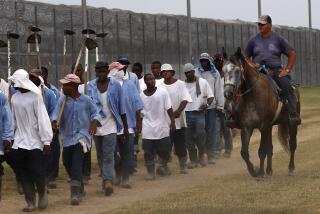Chinese Political Prisoners Reported Brutally Beaten
- Share via
BEIJING — News seldom leaks from Qincheng Prison, a secretive facility on the outskirts of Beijing believed to hold several hundred top student and intellectual leaders arrested for their roles in last spring’s pro-democracy protests.
But as China has lifted martial law in Beijing and begun to release some of those detained last summer, more information is filtering out about conditions there and in other institutions where political prisoners are held.
Asia Watch, a New York-based human rights organization, summarizes much of the currently available material in a report released today that charges Beijing with pursuing a policy of waisong neijin --presenting to the world an external appearance of relaxation while actually intensifying repression.
The report notes a “drastic deterioration in the general standards of human rights observance” since last June’s crackdown, and charges that conditions for prisoners “are both harsh and brutal.”
“The majority of those detained at Qincheng bear wounds and injuries inflicted as a result of severe beatings by prison guards, many have given false confessions under duress, and others have become mentally ill,” the report states in paraphrasing comments by a Chinese student to the Hong Kong newspaper Ming Bao in January.
The student, who according to Ming Bao’s report had recently been released from Qincheng, said that “influenza, lung infections and other diseases were . . . spreading throughout the prison, and ‘pitiful wailing sounds’ could be heard coming from many of the cells.” Students “were being forced to write fresh confessions every day.”
Charges that beatings are commonplace draw support from scenes aired on state-run Chinese television last June, when detained protesters showed obvious bruises. Since mid-summer, however, as China has sought to present a more benign face to the world, there have been few official reports about the treatment of imprisoned demonstrators.
Nearly all unofficial reports have been based on anonymous sources because of the danger inherent in speaking to foreign reporters about such subjects.
But a few days ago, too late to be included in the Asia Watch report, an editor of the official school newspaper at Beijing Teachers University gave the Associated Press an on-the-record interview about his 185-day experience in a Beijing jail, most of whose inmates were ordinary criminals.
The editor, Gao Xin, 33, who became prominent as one of four intellectuals who staged a hunger strike in Tian An Men Square in early June, said he joined the protests because he was angered by the government’s May 20 declaration of martial law.
“The army’s guns should be pointed outward, not inward at the people,” Gao said in his recent interview.
Gao said he shared a 100-square-foot cell with at least seven men at a time and that he was let out for exercise only twice in half a year. For the first three months of confinement, his family and fiancee were unable to learn anything about where he was being held.
“The loneliness of the spirit was terrible,” Gao said. He added, however, that treatment was worse for the accused rapists, murderers and thieves with whom he shared his cell.
“The others got only two steamed rolls at lunch and dinner, but the guards gave me as many as I wanted, because they sympathized with me,” Gao said.
In backing up its charges of beatings and torture, Asia Watch cites statements by Wang Yang, a Chinese citizen who was arrested in July while trying to help a Taiwanese journalist meet secretly with prominent student leader Wang Dan. Wang Dan, who topped the Chinese government’s list of “most wanted” fugitive student activists, was also arrested in this incident. He is believed to be among those now held at Qincheng.
Wang Yang, for reasons that are still not clear, was released after 45 days and allowed to travel to Australia.
In a recent interview with the Hong Kong-based Chinese-language Singtao News, cited by Asia Watch, Wang Yang stated that for his entire 45 days in custody he was shackled by handcuffs and leg irons. He also said that “on each of his daily interrogations by the police he was badly beaten.”
Other released prisoners have told foreign reporters of being touched with electric batons, or cattle prods, which the Asia Watch report describes as “perhaps the most widespread” form of torture used in Chinese prisons.
The Chinese government denies that official policy ever allows the use of torture. But before the June crackdown, the official media occasionally ran articles exposing cases of unauthorized torture.
The Asia Watch report notes that there have been at least 40 officially announced executions of protesters, including many convicted only of crimes against property, such as burning vehicles or setting fire to trains. The report cites the case of Sun Baohe, who according to the Jinan Daily was executed last Oct. 14 for setting fire to an automobile during a June 6 protest.
While most international attention has been focused on the situation of students and intellectuals, the Asia Watch report states that “it is the workers in China who have in fact borne the brunt of the recent and continuing repression.”
Workers “form the great majority of those who have been detained,” the report states. “Their conditions of detention are much harsher than those of other groups. . . . They are also the ones most likely to be subjected to torture and other forms of gross ill-treatment during police interrogation. Significantly, all those known to have been executed since June 4 were either workers or unemployed.”
More to Read
Sign up for Essential California
The most important California stories and recommendations in your inbox every morning.
You may occasionally receive promotional content from the Los Angeles Times.












